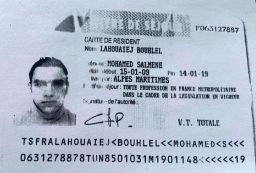Story highlights
Bouhlel had three children
Some neighbors described him as anti-social, others found him to be nice
He was quiet, with a fixed gaze and few words for his neighbors. He didn’t seem suspicious, although one neighbor described him as “very odd.” There was nothing about him that suggested he would drive a nearly 20-ton truck down Nice’s main thoroughfare on Bastille Day, killing at least 84 people.

But police named Mohamed Lahouaiej Bouhlel as the man responsible for what the French president called an “unspeakable act” in the scenic coastal city. At least 10 children were among the dead, French prosecutor François Molins said Friday.
Bouhlel, 31, had three children himself, authorities said.
They didn’t live with him, he was apparently divorced, neighbors said, but when the children came to their father’s apartment, they said hello.
Known by police as a petty criminal
Bouhlel was born in Tunisia on January 3, 1985, Molins said. He had a permit to live and work in France.
He was a delivery driver known to police as a petty criminal who had a series of brushes with the law since 2010 for violence, sometimes with a gun, and thefts, Molins added.
He was arrested in January for violence with a weapon and in March a judge in Nice gave him a six-month jail sentence, which was suspended, the prosecutor said.
French authorities never opened a security file on Bouhlel because he had no known ties to any terrorist or jihadist group, Molins said.
Neighbors in his apartment building told CNN’s Nic Robertson they often saw him walking or riding his bicycle to a cafe for a cup of coffee.
One neighbor, a woman who lived upstairs from Bouhlel, painted a more personable portrait.
He was “never mean to anyone,” said the woman, who didn’t want to give her name because she was so upset. She said Bouhlel would even come to her apartment to help fix things, like the toilet.
The middle-aged woman was visibly upset while speaking to CNN. She said she felt she knew Bouhlel, and is shocked by what authorities said he’s done.
Investigators look for terrorist ties
Molins said Bouhlel was seen on surveillance video Thursday riding his bike to a rented refrigerated truck that was parked east of Nice. Bouhlel put his bike in the back of the truck and got into the cab, and then drove it to the famous boulevard.
Authorities identified Bouhlel from his fingerprints, Molins said, and from his driver’s card found in the truck. They also seized other papers and Bouhlel’s cellphone as they investigate whether he is tied to accomplices or any terrorist group, Molins said.
There don’t appear to be any obvious indications that Bouhlel was radicalized in a French prison or by a radical mosque – neighbors in other media reports suggest he wasn’t particularly religious. He was born in Tunisia and while it recently has seen its share of terrorist attacks, Bouhlel hadn’t visited his hometown in four years, Molins said.
Tunisian security sources told Reuters that Bouhlel was not known to hold radical or even Islamist views.
But they said he did come from the town of Msaken, near the Mediterranean city of Sousse, which has been the site of devastating terrorist attacks in the past – including the killing of 38 people just over a year ago – most of them British tourists.
ISIS claimed responsibility for that attack, which was carried out by a gunman described as an engineering student about to receive his master’s degree.
Tunisian President Beji Caid Essebsi said the Nice attack – which he called barbaric and cowardly – resembled the Sousse attack in June 2015, according to the Tunisian News Agency.
On March 18, 2015, three terrorists killed 20 foreigners and two Tunisians in an attack at the Bardo National Museum in Tunis.
Other attacks in Sousse include a suicide bomber who blew himself up in a botched attack in October 2013.
Terrorism has increased in Tunisia since the election of the secular Essebsi in 2014, with much of it directed at security forces and tourists. As many as 60 security and military troops have been killed in recent years.
The north African country has become a pluralistic democracy since the Jasmine Revolution of 2011, which spawned the Arab Spring, the regional uprising that led to a brutal civil war in Syria, a failing state in Libya and a repressive counterrevolution in Egypt.
Last November, dozens of people were arrested in connection with the bombing of a bus carrying members of the Tunisian presidential guard, including the suicide bomber’s mother and sister.
ISIS, which has been gaining strength in Tunisia, claimed responsibility for the bombing that killed 12 people.
CNN’s Sebastian Shukla and Dominique van Heerden contributed to this report.







